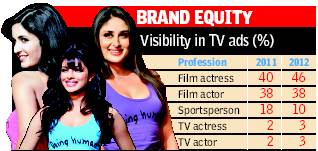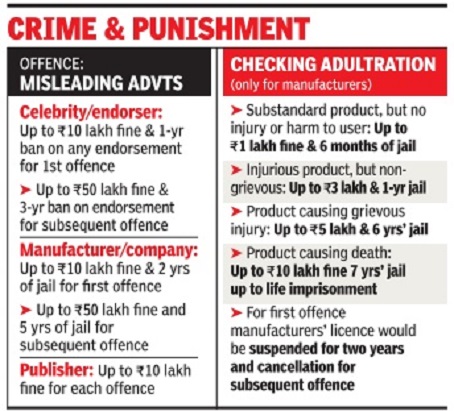Advertising industry: India
Contents |
Television advertising and celebrities
2013: Filmistan actresses outstrip actors
MUMBAI: Bollywood's leading ladies have pipped their male counterparts on the visibility score on the telly as more brands lapped them up for advertising campaigns in 2012. Female actors saw their presence increase from 40% to 46% in the overall celebrity endorsement market on TV even as male actors stagnated over the last two years with a 38% share, reveals latest data collated by TAM, a television audience measurement agency, and exclusively shared with TOI.
Not surprisingly, sports celebrities saw their visibility decline by 8% from 2011, largely due to the lacklustre performance of the Indian cricket team. Cricketers form the biggest chunk of sports endorsements in India.
Among companies, FMCG biggies Hindustan Unilever (HUL) and Procter & Gamble (P&G) emerged as the two biggest advertisers using celebrities followed by Brooke Bond Lipton and L'Oreal India. Notably, top ten advertisers using celebrities comprised only FMCG brands.
TAM AdEx takes into account advertising volumes for its analysis and tracks the visibility of the celebrities on television. The data is not representative of ad spends or how much the celebrities earn per endorsement.
Shahrukh Khan remained the most visible face on television with an 8% share followed by Kareena Kapoor. Other women actors among top 10 celebrities according to ad volumes were Katrina Kaif, Priyanka Chopra, Kajol and Anushka Sharma.
"FMCG brands have to differentiate themselves in highly penetrated categories like soaps and shampoos. The more undifferentiated your product is, marketers need to bring in a clutter breaking tool and celebrities are a big part of the plan in that case," said Basabdutta Chowdhury, CEO of Platinum Media, a division of media buying group Madison that buys media for FMCG majors like P&G, Marico and Godrej. FMCG brands contribute almost 55% to the overall advertising spends in the country.
Celebrity management firms said with a new brigade of female actors in the endorsement market, more brands are willing to get on board these young faces to tap into the youth factor. Neeraj Garg, VP, juice business, Coca-Cola India, said after signing on Parineeti Chopra for Maaza, "She is a young achiever who epitomizes the young India as someone who is go-getter, energetic, wanting to make a difference and sure of themselves."
Others like Deepika Padukone, Anushka Sharma and Nargis Fakhri have also made an impact on the endorsement scene, mostly in the consumer goods space. However, new faces among the male actors such as Ayushman Khurana and Ranveer Singh have not found the same success.
"For younger female actors there are many categories in the beauty and consumer goods space which are suitable for them to endorse unlike how it is for the male actors," said Anirban Das Blah, chief executive & MD, CAA Kwan, a celebrity management agency.
Celebrity endorsements and the law
2016: Ministerial panel recommends penalty of up to Rs 10 lakh
Dipak Dash, Celebs may face ban for misleading ads. Nov 11 2016 : The Times of India
No Jail Term, Fine Could Go Up To Rs 10L
A panel of ministers has approved imposing a fine of up to Rs 10 lakh and a one year ban on celebrities who endorse products making unrealistic claims for the first offence, but has dropped the controversial proposal for a jail term.
The jail term for celebrities to endorse a product making misleading claims had been recommended by a parliamentary standing committee. The ministerial panel has recommended a penalty of up to Rs 10 lakh fine for the manufacturer and two years jail for first offence, said sources. But even publishers and broadcasters would have to pay up to Rs 10 lakh for every such offence -a recommendation that may prove to be contentious and could, if accepted, be challenged by the publishing industry. For celebrities, the penalty recommended is also up to Rs 50 lakh besides a ban on endorsements for the second and subsequent offences.
For firms which put out misleading advertisements, the panel has suggested a fine of up to Rs 50 lakh and a jail term of five years. There are, however, certain conditions that offer publishers or broadcasters relief if they carry advertisement “in ordinary course of their business“. But they would face action for publishing or broadcasting an ad, if the central authority has notified it as misleading and has ordered its withdrawal.
The “due diligence“ clause for celebrities to avoid penalty would be defined later. These recommendations are likely to be included in the Consumer Protection Bill as well.
ASCI’s 2017 guidelines
New ad norms for celebs, April 14, 2017: The Times of India
Advertising Standards Council of India (ASCI), the ad industry's self-regulatory body, has released a set of guidelines for celebrity endorsements that bring personalities, including doctors, authors, activists and educationists, into the celebrity category . This comes at a time when the Consumer Affairs Ministry is intending to review the Consumer Protection Act and may have a provision to deal with misleading ads.
Apart from actors and sportspersons, well-known personalities are expected to have knowledge of ASCI codes and it is the duty of the advertiser and the agency to make sure that the celebrity is made aware of them, said ASCI. “Celebrities have a strong influence on consumers and are guided by the choices they make or endorse,“ said Srinivasan K Swamy , chairman, ASCI. ASCI said celebrities should do due diligence to ensure that all description, claims and comparisons made are capable of being objectively ascertained and not mislead or appear deceptive.
Religious images in advertisments
The Times of India, Jul 24, 2015
Amit Anand Choudhary
No wrong in using God picture for commercial purposes:SC
A bench headed by Chief Justice HL Dattu refused to entertain a PIL seeking its direction to ban use of picture on commercial products and advertisements. RELATED Olivia Wilde posts picture with sonCracks seen in Hussainabad Picture Gallery7 ways to get picture perfect smileGovt advertisements go without CM’s pictureSeth Rogen shares new picture from 'Preacher' set NEW DELHI: The Supreme Court on Friday said that there is nothing wrong in people using picture of God for commercial purpose in their products.
A bench headed by Chief Justice HL Dattu refused to entertain a PIL seeking its direction to ban use of picture on commercial products and advertisements.
"If i have my god on my car, house or home then what is wrong with it. Why should we restrain people from using picture of god" the court said.

